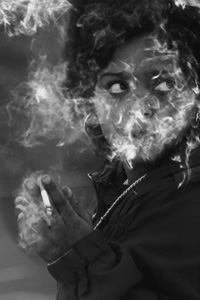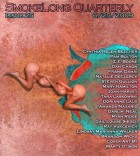Great title! It feels like the perfect title for this perfect story. What do you like about this title?—and how do you find titles for your stories? Any tricks you can share with us would be greatly appreciated.
Sometimes I like titles that are just slightly angled away from a story. They use a familiar phrase and give it a new twist. I have a story called “Down the Aisle” coming out in “Juice Box,” and that phrase suggests a wedding march. But it’s about a woman shopping in the apple aisle at the grocery store. There are other overtones to the story that advert back to romance—so the title adds an extra layer, perhaps. “Home Economics” is like that. The phrase conjures up junior high school sewing and cooking classes. Yet the story is about a different and more brutal kind of economizing. Thus a gap between expectation and story. I hope that 45 degree turn in meaning makes the reader think about Marguerite’s situation a bit harder.
When Zoe Kaufman drew the sketch for this story, she asked me about a title. It could have been “Marguerite Showers” or “In the Shower.” But I suggested “The Showerer” because it’s a tiny bit off—and harkens to a tradition of paintings and sketches called “The Bather” by great artist going back centuries. Zoe is a fine, classical painter with breathtaking work on her website: www.zoekaufman.com.
I have no title-writing tips. In my paid writing, I invent titles: headlines for press releases, titles for reports, slogans for campaigns. So ‘titling’ is a habit. It’s the only part of writing I find easy. If I could write stories the way I write titles, I’d be prolific. As it is, I write only a few stories a year.
I don’t want to overplay the importance of titles, though. I am often completely absorbed in a book and don’t remember the title, or the author—and sometimes I even forget the names of characters. It’s the emotional potency of the story which rivets me. A good title is just a bonus.
I really like the opening of “things that lubricate” being transformed, as the piece progresses, “to pummel.” It has been a lifetime of collecting these unused tiny things, from hotels and hospitals, a very cool compressed metaphor that sums up her life until now. Or at least that’s how I’m reading it. How conscious are you of the need for metaphor in these very short pieces? And what metaphor do you see at work in “Home Economics”?
Interesting question. I believe that an observed or felt metaphor often moves me to write something. Last week I saw a blind woman reading a large Braille book and the way she used her hands was not at all how I imagined she would. Instead of swiping her fingertip along a line from the inside fold, she ran her hands across the page in overlapping swoops, as if playing a harp. I wanted to write about it. So I guess I got to, here.
Yes, Marguerite’s objects are her history, her memory—herself, really. They are more than things, which is why using them up is so bittersweet.
I see Marguerite as entering a new world (for her) that is about “economizing”-a reduction and compression of one’s life to its essentials. Dial, cheese sandwich, train, water, news, toothbrush, coffee, aspirin, hunting. It’s the creation of a ritual, of sorts, one that fails to ward off further loss, now of her job, the last of the kibble, the end of the freebie soap. We all have our rituals, yes?
Rituals and superstitions. I am sometimes prone to superstitions and am afraid I impart that oddity to my characters. I had a story in Wigleaf, “Mathematical Superstition,” that is entirely fiction, but is composed of ritualistic, superstitious thinking.
The writing has that sense of fixity—each image and word in the right slot, nothing wasted, the proper amount of weight. How do you get that sense in your writing? Do you have a process that works? Does it come naturally to you?
I write wordy, sloppy first drafts. I’m repetitive by nature. I’ve learned to pare back and pare back by reading taut and elegant work like yours or Amy Hempel’s. Then perhaps someone in Kim Chinquee’s Hot Pants workshop will suggest cutting something more. The Ludwig Mies van der Rohe school of writing, less is more. It takes me a very long time to write a tight, short piece. Starting on paper and moving to the screen helps.
What is life like these days just barely outside Chicago?
Cold and rainy. Seattle without the mountains. Yet, it’s the most beautiful city I’ve ever seen. But I go to Paris this summer, so I’m sure I’ll be editing away that claim in a future revision of my life.



 In September 2022 SmokeLong launched a workshop environment/community christened SmokeLong Fitness. This community workshop is happening right now on our dedicated workshop site. If you choose to join us, you will work in a small group of around 15-20 participants to give and receive feedback on flash narratives—one new writing task each week.
In September 2022 SmokeLong launched a workshop environment/community christened SmokeLong Fitness. This community workshop is happening right now on our dedicated workshop site. If you choose to join us, you will work in a small group of around 15-20 participants to give and receive feedback on flash narratives—one new writing task each week.